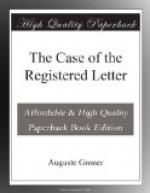“What evidence have we that this man did not commit suicide? We have the evidence of the disorder in the room, a disorder that could have been made just as well by the man himself before he ended his own life. We have the evidence of a letter to some unknown, making plans for pleasure during the next days, and speaking of further plans, presumably concerning business, for the future. In a town the size of G—, where every one must have read of the murder, no one has come forward claiming to be the friend for whom this letter was written. Until this Unknown makes himself known, the letter as an evidence points rather to premeditated suicide than to the contrary. Oh, if I could only have seen the body! They tell me the pistol was found some little distance from the body. Is it at all likely that a murderer would go away leaving such evidence behind him? If Graumaun had killed Siders in a hasty quarrel, he might possibly, in his excitement, have left his revolver. But I have already disposed of this possibility. A man of sufficient brains to so carefully plan his suicide as to conceal every trace of it and cast suspicion upon the man who had made him unhappy, such a one would be quite clever enough to throw the pistol far away from his body and to leave no traces of powder on his coat or any such other evidence.
“If I were to say now what I think, I would say that John Siders deliberately took his own life and planned it in such a way as to cast suspicion upon Albert Graumann. But that would indeed be a terrible revenge. And I must have some tangible proof of it before any court will accept my belief. This proof must be hidden somewhere. The thing for me to do is to find it.”
The evidence gathered at the time of the death went to show that Siders had been paid a considerable sum in cash for the sale of his property at Grunau. And there was no trace of his having deposited this sum in any bank in G— or in Grunau, in both of which places he had deposited other securities. Therefore the money had presumably been in his room at the time of his death. A search had been made for this money in every possible place of concealment among the dead man’s belongings, and it had not been found. Muller asked the Police Commissioner to give him the key to the rooms, which were still officially closed, and also the keys to the dead man’s pieces of baggage. Commissioner Lange seemed to think all this extra search quite unnecessary, as it did not occur to him that anything else was to be looked for except the money.
It was quite late when Muller began his examination of the dead man’s effects. He was struck by the fact that there was scarcely a bit of paper to be found anywhere, no letters, no business papers, except bank books showing the amount of his securities in the bank in G— and in Grunau, and giving facts about some investments in Chicago. There was nothing of more recent date and no personal correspondence




